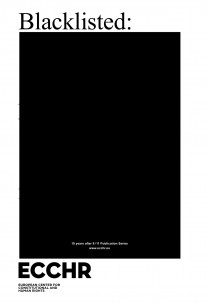Blacklisted Targeted sanctions, preemptive security and fundamental rights
Human rights experts call for abolition of United Nations ‘terrorist list’ and wholesale reform of EU blacklisting regime.

Authors
The European Center for Constitutional and Human Rights (ECCHR) has published a detailed critique of the terrorist blacklisting regimes operated by the United Nations and the European Union and documenting the crisis currently facing blacklisting at the international level.
The Report - Blacklisted: Targeted sanctions, preemptive security and fundamental rights by Gavin Sullivan and Ben Hayes - provides a comprehensive review of the development and implementation of the ‘terrorism lists’ over the last decade. It analyses the impact of the blacklists on human rights and endorses the growing body of expert legal opinion that these regimes are fundamentally incompatible with the most basic standards of due process.
Listing decisions are usually based on secret intelligence material that neither blacklisted individuals nor the Courts responsible for reviewing the implementation of the lists will ever see. As numerous national and regional Courts have repeatedly affirmed, affected parties cannot contest the allegations against them (and exercise their right to judicial review) if they are prevented from knowing what the allegations actually are. Such treatment fundamentally violates the right to a fair trial, yet is an ongoing Kafkaesque reality for those on the blacklists.
By effectively outsourcing the definition of ‘terrorism’ to nation states, the United Nations has encouraged the criminalisation of groups on the basis of geo-political, foreign policy or diplomatic interests. The criminalisation of self-determination movements that has resulted has transformed Diaspora communities that support them into ‘suspect communities’ and obstructed peace processes aimed at resolving such conflicts.
Like control orders and administrative detention without charge, blacklisting has been seen as a key component of the pre-emptive security agenda pursued by states in the years since 9/11. Whilst it is widely accepted that the lists have been largely ineffective in blocking terrorist financing, states have nonetheless prioritised blacklisting as a means of facilitating prolonged interference with the lives of terrorist suspects on the basis of intelligence material incapable of withstanding proper judicial scrutiny.
With blacklisting now facing a crisis of legitimacy the authors argue that the time has now come for the UN Security Council Resolutions underpinning these regimes to be repealed.

